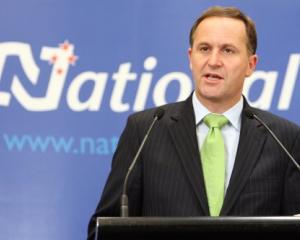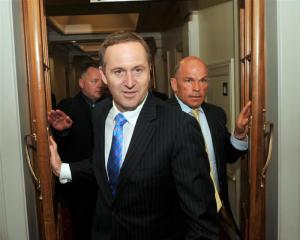Four months ago, the Government had $2 billion in cash sitting on its books. Now, it is projecting a $6 billion deficit for next year.
So why the $8 billion turnaround?An operating balance of $5.6 billion has turned into a $64 million deficit, which will keep growing as the years progress.
What changed so quickly?
The global financial tsunami engulfed the Government's much-prized surpluses, turning them into deficits in about four months and making election spending promises much harder to justify.
Otago Daily Times investigations into where the money went revealed just how much the world has changed since 2005.
With the Government accounts having been in surplus since about 1994, the quickly deteriorating global financial system has seen the cash turn into a red sea of ink faster than most people can comprehend.
Where did the good times go?
The ODT had hoped to talk to Finance Minister Michael Cullen about the issue, but his office referred the questions to the Treasury.
The Treasury had, on Monday, provided some questions and answers about the major drivers of the weaker outlook, but it was hoped Dr Cullen could help explain how government spending promises had added to that.
We also tried to talk to National Party leader John Key and finance spokesman Bill English about the issue of the disappearing cash.
They did not return calls but, like Dr Cullen, made sure their offices were busy sending out press releases criticising the other party's policies.
In 2005, Dr Cullen was crowing that his fiscal strategy involved meeting the cost of much of the Government's capital spending from operating surpluses, rather than from borrowing.
"Some people argue that is acceptable to borrow to fund capital spending because that is what a household or corporate would do. However, it is dangerous to take these comparisons too far when applied to the Government."
Many important areas of capital spending did not generate a direct monetary return or contribute directly to raising growth that could be used to offset the cost of extra debt, he said in the 2005 budget policy statement.
Economists spoken to yesterday were nervous about making comments that could be construed as political.
But, in general, they agreed funding infrastructure spending out of cash, rather than borrowing, contributed to a cash balance turning into a deficit.
The economists believed Dr Cullen was embarrassed by the growing surpluses and faced the choice of giving it back to the people through tax cuts or spending it.
Dr Cullen was a reluctant tax-cutter so he spent the money on infrastructure, policies like free early child care, Working for Families and KiwiSaver.
In 2005, the Treasury forecast that government revenue would be $69.8 billion in 2006, $72 billion in 2007, $74.6 billion in 2008, $77 billion in 2009, and $82 billion in 2010.
Figures released on Monday by the Treasury showed the actual revenue in 2008 was $61.7 billion.
It is forecast to fall to $61 billion next year, before rising to $65 billion in 2011.
The difference between the 2005 and 2008 figures is the Government expenses, which are now forecast to be more than revenue.
That turns the operating balance excluding revaluations, accounting losses and gains from a $5.6 billion surplus this year to a $64 million deficit next year, a $1.7 billion deficit in 2010, $2.5 billion deficit in 2011 and $3 billion in 2012.
Core Crown cash turns from a $2 billion surplus this year to a nearly $6 billion deficit next year, with deficits remaining between $5.3 billion and $7 billion between 2010 and 2013.
WHK Taylor's tax principal Scott Mason said the only Government money available to spend came from taxes.
But with the business community taking a beating, taxation was dropping.
GST was forecast to drop as people stopped spending.
Government income was dropping.
"How do you fund that? You either have something put away for a rainy day or resort to borrowing. If you think about it with your salary, if that stops, you might have some savings for the short-term, but longer term you have to borrow."
Mr Mason was busy reassessing downward his clients' provisional tax as quickly as he could because hard times meant businesses would pay less tax.
Things would get worse once businesses ran out of cash and had to lay off workers.
That was why Treasury was forecasting an increase in unemployment benefit payments.
In Queenstown, failing property developments would put pressure on tradespeople as they found work slowing up.
They would spend less, meaning they would pay even less tax.
"It's fair to say the writing has been on the wall earlier than officials reacted to it. It has been accelerated through the worldwide crisis."







